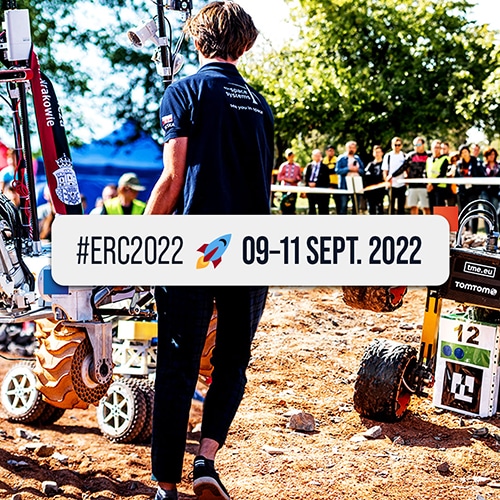Nearly 100 teams from all over the world are taking part in the prestigious competition of Martian robots in Poland
The registration of university teams for this year’s eighth edition of the reputable European Rover Challenge has closed. In total, 92 applications have been submitted from the best technical universities in the world, including countries such as Canada, Switzerland, Germany, India, Colombia, and Poland. This year’s ERC will be held on the world’s largest artificial Martian track located at the Kielce University of Technology in Poland.
The ERC 2022 competition will take place on September 9-11 and, as in previous years, will be carried out in two formulas: on-site, in which robots constructed by teams compete in the field, and the only hybrid formula in the world, in which competitors from around the world connect remotely with the Leo mobile robot and a robotic arm, located on the track in Kielce.
At the most anticipated space-robotic event of the year, in addition to competition based on the real missions of the European Space Agency and NASA, there will also be an inspiration zone open to the public filled with attractions for space, robotics and science enthusiasts. The event program includes unique interdisciplinary debates on the future of human settlement on the Red Planet, the survival of the first astronauts in the moon bases planned by NASA or ESA and important topics related to the commercialization and use of space technologies on Earth.
Thanks to broadcasts and live coverage in social media, the event will reach a wide audience around the world, disseminating scientific and technological achievements in the field of space and robotics. Last year’s edition of the ERC, thanks to the social media and internet coverage, was attended by almost half a million people from the farthest corners of the world.
The European Rover Challenge is held under the patronage of the European Space Agency ESA and the Polish Space Agency. For years, the event has also been supported by the presence of, among others NASA heads and deputy heads Steve Jurczyk and Robert D. Cabana, astronauts Apollo 17’s Harrison Schmitt and ESA’s Timothy Peake, heads of ESA robotics departments and the German Space Agency DLR, representatives of the European Union Agency for the EUSPA Space Program, as well as international heads and decision makers of space organizations and companies such as the International Space University ISU, The Mars Society, Explore Mars, Austrian Space Forum, Breakthrough Foundation, Thales Alenia Space, GMV, Planet Labs and SENER.
This year’s edition is co-organized by the European Space Foundation and the Kielce University of Technology, while Mars Society Polska, Poznań University of Technology, the Association of Polish Space Professionals PSPA, Kell Ideas, as well as the American corporation Mathworks and Mastercam have already joined the group of partners. The project was co-financed by the “Social Responsibility of Science” program of the Polish Minister of Education and Science.
This year’s edition is co-organized by the European Space Foundation and the Kielce University of Technology, while Mars Society Polska, Poznań University of Technology, the Association of Polish Space Professionals PSPA, Kell Ideas, as well as the American corporation Mathworks and Mastercam have already joined the group of partners. The project was co-financed by the “Social Responsibility of Science” program of the Polish Minister of Education and Science.

